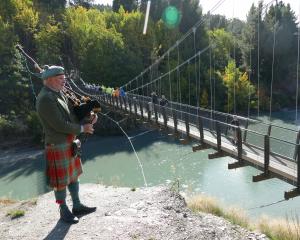Long-time local farmers and rural residents say the problem’s never been worse.
Jim Hunter, who lives above Lake Hayes, says there’s a rabbit plague in the area. “I’m under siege – I’ve had to put double fencing around my property.”
Given a .22 rifle, a silencer and night vision, “I reckon I could do huge damage, but I’m just scared someone will complain and then I’m in the s***”.
Hunter’s aware ORC believes rabbit control’s a landowner’s responsibility.
“But how do you go about it?
“You can put poison on your property, but what if nobody else does it?”
So many properties are being chopped up, you’d never get everybody to agree on a coordinated plan, he says.

He says ORC’s been “a dismal failure”.
He notes it introduced a virus, RHDV K5, a year ago, “but in our area it’s had absolutely no effect”.
Guthrie also points to the hazards that rabbit holes pose to both humans and horses.
King Allen says he put gas pellets down rabbit holes, “but the whole area’s so infested with them, within a few weeks there were just as many back again”.
Lifelong local farmer Alan ‘Hammy’ Hamilton, 88, who’s never seen it worse, says some shooters bag up to 80 rabbits a night on his property.
He suggests ORC’s “virtually washed its hands” of the problem.
He says it should “put a lot of our rate money into doing something about getting a new virus or a proper virus”.
Cromwell-based ORC councillor Michael Laws says he’s had “enormous frustration” with his organisation’s rabbit control policy.
“The ORC says ‘it’s your problem’, and simply doesn’t enforce or even monitor those thousands of individuals and landowners who are doing absolutely nothing.
“But on the other hand, trying to suggest that rabbits will stay confined into one particular geographic area is also absurd, so the only mechanism is for the ORC to effectively take responsibility on a day-to-day basis for rabbit control in the region.
“And that’s what I’ll be promoting at this coming election.”
As for eradication methods, he suggests “you use everything that you’ve got” – be it viruses, shooting or poisoning – while constantly monitoring it.
Laws says the RHDV K5 virus failed in Central Otago because rabbits built up immunity after an earlier variant of the virus was released in the late ’90s.
ORC also needs to ensure government departments like Department of Conservation and local councils play their part, he says.
“I’m struggling to remember any government department or territorial authority that has had an infringement or abatement notice put on it for rabbit numbers over the last five years.”
Richard Lord, ORC’s biosecurity and biodiversity boss, confirms rabbit management’s the responsibility of landowners, but says it provides some regional assistance – he cites last year’s virus release, monitoring the implementation of its pest plan and providing advice for landowners.
“It’s key that landowners take whatever conventional control measures they can this winter to prolong the impact of the RHDV K5 virus.”
These include poison, fumigation, rabbit-proof fencing, night shooting and trapping.
“Many landowners are already doing great work in this area, and we’re keen to collaborate and support that work where we can.”
Lord says ORC doesn’t develop or import viruses for pest management, but is responsible for the release and monitoring of viruses like RHDV K5.
However, biocontrols like this “cannot be treated as a silver bullet, and to be effective they must be supplemented with control methods by landowners”.
Lord confirms the virus was released at a number of Wakatipu sites, but notes that “results were variable”.












